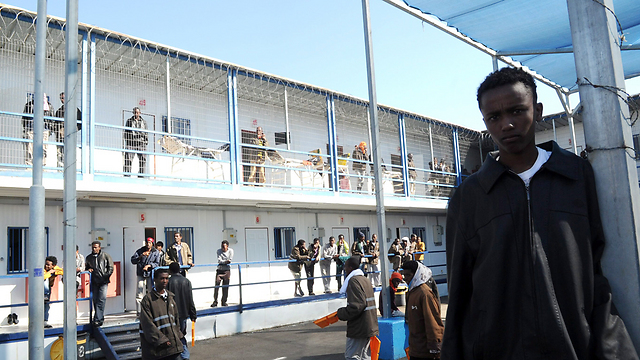Court rejects most of petition filed by human rights organizations against third version of bill, but strikes down clause allowing detention exceeding 12 months; nearly 1,200 to be released within two weeks.
Nine Supreme Court justices on Tuesday rejected a petition filed by human rights groups regarding the legality of the third and most recent version of the so-called “Infiltration Prevention Law”, with the exception of the clause ruling that illegal migrants and asylum seekers could be held for up to 20 months in the Holot facility.
The court said it unanimously rejected the petitioners’ objection to the clause allowing new asylum seekers to be held in custody for up to three months.
This was the third time in less than two years that the court altered elements of the law.

The controversial amendment included two clauses. The first sought to permit detaining new asylum seekers for up to three months in the Saharonim detention facility. The second was aimed at regulating operations at the Holot facility. The amendment included the decrease of the maximum detention time for new asylum seekers from a year to three months.
The clause saying that people could be held in Holot for up to 20 months was struck down for being “disproportional”. The justices noted that after six months, in the absence of new legislation, no further laws on detaining asylum seekers can be passed.
Supreme Court Chief Justice Miriam Naor wrote that the law was constitutional, other than the clauses setting the maximum amount of time people can be held in a detention center. According to the ruling, this period will remain at 12 months for the following six months. Those who have currently been detained for 12 months or more will be immediately released. About 1,200 people who have been detained at Holot for 12 months or longer will be released within 15 days.
“It wasn’t a detention center like Holot as it was created that I imagined when I wrote these things,” wrote Justice Naor. “As a citizen, I would have been happy to see my country show more compassion, even towards those suspected of infiltrating Israel to make money. That said, just as we do not examine the wisdom of the law, we do not put ourselves in the role of the legislator. Our role is to examine the constitutionality of the law.”
A statement by the petitioning organizations said following the ruling: “The court showed for the third time that the legislature that the legislature did not devote in-depth thought and debate before ordering the deprivation of liberty from thousands of people.”
The Infiltration Prevention Act has been part of a lengthy legal saga. In September 2013, the Supreme Court overturned an amendment that would allow asylum seekers who crossed illegally at the Egyptian border to be detained for three years. About a year later, it overturned another amendment, which would have allowed new asylum seekers arriving from the Egyptian border to be detained for a year.
Following these two decisions, the Knesset passed another amendment in November 2014, which would allow detention for 20 months if the individuals were already in Israel, and three months for newcomers.
As reported by Ynetnews
